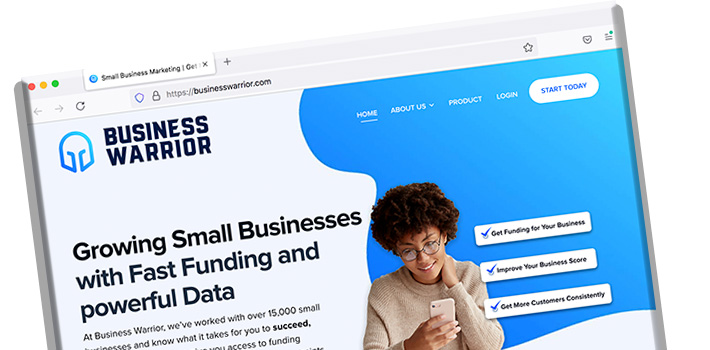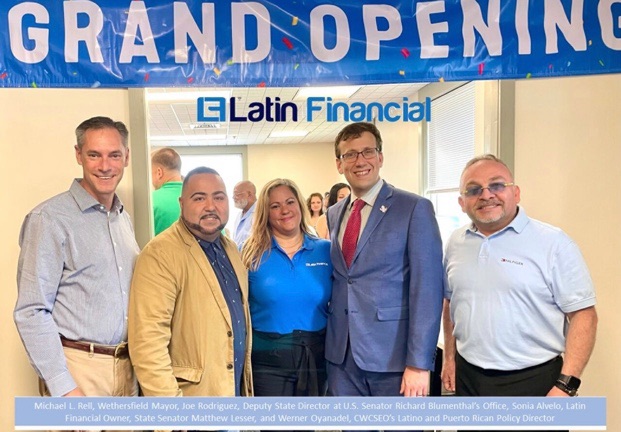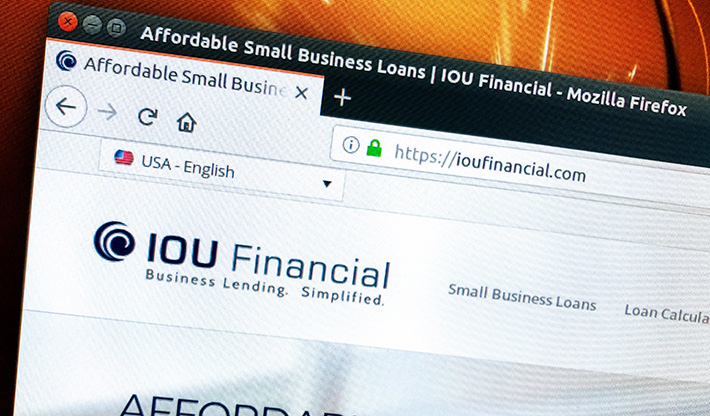Business Lending
The Company That Acquired Alchemy Technologies is a Small Business Lender
June 9, 2022 The sale of Alchemy Technologies to Business Warrior was announced on Thursday. The sale price of $8.75M ($2.25M in cash), is more than 3x Alchemy’s 2021 revenue of $2.8M.
The sale of Alchemy Technologies to Business Warrior was announced on Thursday. The sale price of $8.75M ($2.25M in cash), is more than 3x Alchemy’s 2021 revenue of $2.8M.
While Business Warrior describes itself as “the source for small businesses in America to get more customers,” its homepage leads with a pitch for a working capital loan. “Our goal is to give you access to funding before you need it so you can grow without the restraints set on you by your bank,” the website says.
Business Warrior provides loans from $5,000 to $100,000 with interest rates as low as 7.97% and with terms between 12-36 months. It also offers marketing, software, and scaling solutions.
“After working with Alchemy, we quickly realized the massive potential of adding this international group of industry leaders to the Business Warrior team,” said Jonathan Brooks, Business Warrior President, in a press release. “With our Business Warrior platform, premium marketing, and now a global lending technology presence, we are building solutions that propel the success of small businesses.”
“We are so excited about joining the Business Warrior family!” said Timothy Li, CEO of Alchemy. “This move provides Alchemy with the additional resources, tools and capital necessary to enhance our service to customers. Both companies believe small business owners are the lifeline of local communities. By bringing Alchemy and Business Warrior together, the positive impact on these communities is going to be worldwide.”
Business Warrior is publicly traded under the ticker (OTC: BZWR).
Grand Opening of Latin Financial’s New Office Joined by Public Officials, Family, and Friends
June 4, 2022 Just a few miles outside of Hartford, cars exited the highway and advanced towards a quieter part of Connecticut. The aptly named “Beaver Road” is home to Wethersfield’s US Postal Service building on one side and the Connecticut Farm Bureau building on the other. Drivers veered towards the latter and pulled into a parking lot situated behind a literal babbling brook. There are other tenants besides the Farm Bureau in the expansive brown-bricked commercial-use building as indicated by a sign outside, but the business that people had come to celebrate hadn’t even been added to it yet.
Just a few miles outside of Hartford, cars exited the highway and advanced towards a quieter part of Connecticut. The aptly named “Beaver Road” is home to Wethersfield’s US Postal Service building on one side and the Connecticut Farm Bureau building on the other. Drivers veered towards the latter and pulled into a parking lot situated behind a literal babbling brook. There are other tenants besides the Farm Bureau in the expansive brown-bricked commercial-use building as indicated by a sign outside, but the business that people had come to celebrate hadn’t even been added to it yet.
Nevertheless, the blue and white balloons waving in the wind outside the back entrance were a clue that this was the right place. Inside, on the first floor, a line of people found the large plated logo of Latin Financial, a small business that helps other small businesses obtain working capital.
Already personally acquainted with the firm led by Sonia Alvelo, she led myself and others on a tour of the company’s new space. Latin Financial employees were easily identifiable by their blue company shirts, but others wore green to signal that they were part of a sister company named Sharpe Capital. Sharpe is spearheaded by Brendan P. Lynch.
Both brands previously operated in nearby Newington but outgrew what they had. When the ceremony officially kicked off with some impromptu speeches, the prominence of those assembled became evident. It included, among others, the Better Business Bureau, the local Chamber of Commerce, and the Connecticut Children’s Hospital.
Wethersfield’s mayor, Michael Rell, was also there. Rell welcomed Latin Financial to the neighborhood, echoing the note sang by other government officials.
Connecticut State Senator Matthew Lesser shared his appreciation for Alvelo and her company’s mission to provide capital to underserved small businesses both in the state and across the nation. Lesser explained that the state legislature had recently decided to delay a proposed commercial financing bill (Senate Bill 272) so that it could further assess the input from companies like Latin Financial and the potential impact it would have before moving forward. A version of the bill will be reintroduced next year.
Meanwhile, Joseph Rodriguez, Deputy State Director for US Senator Richard Blumenthal’s office, said that he was impressed by the company’s accomplishiments and contributions to the community. He presented Alvelo with a Certificate of Special Recognition signed by Blumenthal in honor of her new office and for her service to Connecticut Small Businesses.

Werner Oyanadel, Latino and Puerto Rican Policy Director at the Connecticut General Assembly’s Commission on Women, Children, Seniors, Equity & Opportunity, said that Alvelo had “been a good partner of [their] work at the Capitol” and that “Latin Financial is filling a big void assisting new businesses and Latino entrepreneurs’ access to needed reources.”
Employees of both Latin Financial and Sharpe appeared excited by all the fanfare while friends and family members were proud to share in the moment. Alvelo ceremoniously cut a blue ribbon for the cameras and in conversations that followed it became known that they were hiring.
Alvelo has previously spoken at Broker Fair in New York and deBanked CONNECT Miami. She has been a primary source of information for deBanked since 2016 on matters regarding small business financing in Puerto Rico.
Economic Hurricane? Timeless Advice For Your Small Business Finance Company
June 2, 2022 “You know, I said there’s storm clouds but I’m going to change it … it’s a hurricane,” said JPMorgan CEO Jamie Dimon about the current economic situation. “JPMorgan is bracing ourselves and we’re going to be very conservative with our balance sheet.”
“You know, I said there’s storm clouds but I’m going to change it … it’s a hurricane,” said JPMorgan CEO Jamie Dimon about the current economic situation. “JPMorgan is bracing ourselves and we’re going to be very conservative with our balance sheet.”
At the very least, Dimon is predicting that a recession may be just around the corner. And if that’s the case, we dug up some timeless advice about how a small business finance company can brace itself for such a scenario. These quotes are from 2016 when economic experts were already beginning to wonder if the economy had already overheated, if you can imagine that.
“If the market moves sideways and you rely only on a single source of funding, you are at risk. It’s an incredibly obvious statement, but it becomes more acute when the economic environment comes under pressure.” – Glenn Goldman
“Liquidity is king. The more that participants in this market are able to diversify their capital structure, diversify their funding sources and work with multiple providers, the better off they will be.” – David Snitkof
“[Funders will have to decide] to tighten and pivot while the rest of the players in the space are going full steam ahead. That’s where you have to have some conviction and trust your data and do the right thing.” – Stephen Sheinbaum.
“Just because someone paid you back yesterday doesn’t mean he’s going to pay you back tomorrow. You have to be right more often in a recessionary environment.” – Andrew Reiser
“A small recession could lead to big failures if you don’t take the right steps.” – Yoel Wagschal
In April 2016, when recession predictions were making the rounds, the S&P 500 was ~2,000, Bitcoin was $450, Ethereum was $8, gas was ~$2.20/gallon, and few, if any people, believed that Donald Trump would ever become President.
The Real Small Business Funding Demand Has Yet to Kick In
May 26, 2022 Now that small and medium sized businesses received crucial PPP and EIDL funding during the COVID-19 pandemic, they have become more familiar with other options to obtain capital.
Now that small and medium sized businesses received crucial PPP and EIDL funding during the COVID-19 pandemic, they have become more familiar with other options to obtain capital.
“…they’re learning that they can borrow money based on their revenue, not based on their credit and assets,” stated Sean Feighan, Co-founder and President of Cash Buoy. Feighan explained that the exercise of obtaining capital during Covid to stay in business created or further developed an appetite for small businesses to borrow money in general.
As these businesses are still utilizing the remaining government aid, the real demand has not truly begun, according to Dylan J Howell, CEO of Liquidibee. “…we have yet to see the real big demand that’s about to kick in, in my opinion, over the next six to twelve months, I believe that a lot more demand will come in,” Howell said. “A lot of companies received a good injection of government stimulus. And they’ve enjoyed that over the last year, year and a half. And as that comes to an end, companies are always looking for additional capital, whether it be to grow or foster future growth of their company.”
“I think we’re beginning now to see a new phase within small business,” said Avi Wernick, VP of Partnerships at FinTap. Because of the money that’s still lingering from the stimulus efforts, he thinks that alternative finance companies will soon see more demand in the coming months. But at the same time, those finance companies will have to determine if they’re even a good fit for their products. “I think some businesses will be more adversely affected. I think it depends a lot on the nature of the business owners, you know there are better business owners out there that are able to manage [their] finances more responsibly, and there are others that are kind of just more reactive.”
Erez Stamler, CEO and Managing Director of Fresh Funding, echoed a similar sentiment. He said that increased risk factors of a business coming out of Covid can make it harder to get them approved. Besides, a business now predisposed to forgivable funding or ultra long terms at very low interest may not necessarily demand other products in the market.
“So you will see demand, but you might not see increased amount of views or volume of deals, because you can’t replace SBA loans with MCA,” Stamler said.
IOU Financial Was Profitable in Q1
May 19, 2022 IOU Financial may have originated $59.6M in small business loans in Q1, but the company also managed to do it profitably. Specifically, IOU recorded net earnings of $1.1M in Q1 2022 compared to a $100,000 net loss over the same period the year prior.
IOU Financial may have originated $59.6M in small business loans in Q1, but the company also managed to do it profitably. Specifically, IOU recorded net earnings of $1.1M in Q1 2022 compared to a $100,000 net loss over the same period the year prior.
“IOU Financial continues to deliver on its promise to stakeholders by growing loan originations and increasing profitability while continuing to invest the scalability of its operations and technology,” said Robert Gloer, President and CEO in a public statement.
IOU’s Q1 revenue totaled $3.9M, earned mostly from servicing and fee revenue that is generated by its marketplace model. $500,000 of it was attributed to referral fee revenue earned by IOU’s direct-to-merchant retail operation called ZING Funding.
Senior Business Lending Exec of Square Has Moved to Coinbase
May 16, 2022 Ronak Daya, who spearheaded several of Square Capital’s lending divisions, including “head of product for business lending” and “head of product for external lending and partnerships,” announced on twitter that he had moved on from the company. He had been involved in SMB lending for 7 straight years. His new role? Head of Financing Products at Coinbase.
Ronak Daya, who spearheaded several of Square Capital’s lending divisions, including “head of product for business lending” and “head of product for external lending and partnerships,” announced on twitter that he had moved on from the company. He had been involved in SMB lending for 7 straight years. His new role? Head of Financing Products at Coinbase.
If you thought Coinbase was just about buying Bitcoin, you’re wrong. Daya announced that he’ll be leading a team “to build lending and financing products both for consumers and institutional clients.”
“As I explored what came after Square, my primary focus was on challenging myself to go in a fundamentally new domain/area, and build for a new customer,” Daya wrote. “The priority was learning. Learning by building in domains that I am passionate about, but know little about.”
Convinced that the world is moving towards becoming a crypto-native economy, Daya added that he wants to “play a part in using trust, ease and education to onboard the next billion customers to a new financial system.”
Currently, Coinbase already offers a lending product, loans up to $1 million at 8% APR with monthly payments and no credit check. Though Bitcoin is used as collateral, payments are made by monthly ACH debit or through a linked USD wallet.
Ready Capital Small Loan Closings Reach New Growth with LenderAI
May 16, 2022 Last week, Ready Capital Corporation announced another company record for small 7(a) loan closings in the $10,000 to $350,000 range. Originating 55 such loans in April, the company attributed its success to the use of LenderAI by iBusiness Funding LLC, a subsidiary of Ready Capital.
Last week, Ready Capital Corporation announced another company record for small 7(a) loan closings in the $10,000 to $350,000 range. Originating 55 such loans in April, the company attributed its success to the use of LenderAI by iBusiness Funding LLC, a subsidiary of Ready Capital.
LenderAI is a technology platform comprised with an easy-to-use suite of tools, according to the company. iBusiness Funding says their “approach to funding is based on automation, backed up by hyper-current and relevant data.” The LenderAI self service lending origination software includes no implementation fees, free instant setup, digital borrower application, digital documentation, all while being E-Train automated and SOC II compliant.
“Our core mission when expanding the SBA small loan program was to help the smallest businesses, making affordable lending available to support economic development and underserved communities,” said Justin Levy, President of Ready Capital Small Balance Lending. “LenderAI has enabled our 7(a) small loan products. The technology platform allows us to process loans for smaller businesses, who have fewer capital options, by digitizing their documents and inputs, giving them access to capital while allowing them to stay focused on their businesses.”
With iBusiness Funding’s LenderAI system, Ready Capital’s Small Loan Lending program funding has increased from 84 loans in 2021 to over 150 loans in the first four months of this year. iBusiness focuses on specific criteria for its borrowers including likelihood of success, engagement, and background/credit.
“We believe our LenderAI technology has drastically improved document collection and processing, streamlining both the borrower and lender experience,” stated Katy Forte Seybold, iBusiness Funding Chief of Staff and Head of Strategy, in a press release. “There’s little risk to trying it out, with bank level security, flexible core platform integrations and, for a limited time, it’s free to try with no implementation fees.”
Register for The 4th Annual Alternative Finance Bar Association Conference
May 12, 2022 The fourth annual Alternative Finance Bar Association conference is BACK IN PERSON. This is the go-to event for and with the industry’s leading attorneys.
The fourth annual Alternative Finance Bar Association conference is BACK IN PERSON. This is the go-to event for and with the industry’s leading attorneys.
Mark your calendars for June 15th and June 16th in New York City and register by emailing Lindsey Rohan at lindsey@lrohanlaw.com. Registration is subject to approval and space availability.
Two-day program includes the following panels:
The State of the Industry: Industry experts discuss pending legislation, case law and market hurdles. They have both a regulatory panel ready to discuss what’s new in Virginia, Utah, NY and California as well as a Courtroom panel ready to discuss the winning and losing case law that has come out in the past year.
Bankruptcy: The aftermath of Chicago v. Fulton, In re Shoot the Moon and other pivotal bankruptcy cases that shape industry practices.
Ethics: Challenges faced by internal counsel and ways to navigate those pressures.
Collections: Trends in the post-COJ, post-COVID era.
Employment/Labor Law: The rise of labor use outside the U.S. What challenges arise from having call centers outside the U.S. Tax implications, oversight and practical benefits/detriments. Post-COVID remote work implications. What you need to be aware of to avoid creating liabilities.
The Art of Arbitration: The importance of a carefully drafted Arbitration Clause and the pro/cons of this venue.
Thinking Ahead: What technologies and market conditions will shape the future of the industry. Broad discussion of Blockchain technology, CRM systems, cannabis and what we can imagine will shape the future of Alternative finance.
WEDNESDAY KEYNOTE: David Picon, Esq. – It is with great pride that David Picon of Proskauer Rose will be the Keynote speaker. For years the AFBA has admired his work from afar. Attendees now have an opportunity to learn directly from David what makes for an unstoppable litigator.
THURSDAY SPECIAL EVENT: AFBA Game Show Mash-Up with the Industry’s Legendary Attorneys. Special Guests you will not want to miss!
Speakers:
- Andrew Smith, Covington & Burlington LLP
- Brian Simon, Hollis Public Affairs
- Jamie Polon, Mavrides Moyal Packman & Sadkin, LLP
- Patrick Siegfried, Rapid Finance
- Natalie Pappas, Rapid Finance
- Keith Ellis, Expansion Capital Group
- Kate Fisher, Hudson Cook LLP
- Cathy Brennan, Hudson Cook LLP
- Blake Sims, Hudson Cook LLP
- Steve Denis, Small Business Finance Association
- Christopher R. Murray, Murray Legal PLLC
- Mark Stout, Padfield & Stout
- Shanna Kaminski, Kaminski Law Group
- Michael W. Davis, DTO Law
- John Viskocil, Fora Financial
- Gabriel Mendelberg, Mendelberg P.C.
- Anthony F. Giuliano, Giuliano Law P.C.
- Jeffrey S. Cianciulli, Weir Greenblatt Pierce LLP
- David Picon, Proskauer Rose
- Jonathan Nelson, Dedicated Financial GBC
- Lindsey Rohan, BasePoint Capital LLC
- Christina Grigorian, Katten; Zach Miller, Burr & Foreman
- Renata Buhkman, Delta Bridge Funding
- Vanessa Petty, Settle
- Alexis Shapiro, Forward Financing
- Jan Owens, Manatt Phelps
- Scott Pearson, Manatt Phelps
- Jesse Michael Carlson, Kapitus
- Robert Zadek, Buchalter
When:
Day 1 – June 15
9:00am – 4:30pm: Offices of Proskauer Rose (includes light breakfast and lunch)
5:30pm – 7:30pm: Cocktails at Dear Irving
Day 2 – June 16
9:30am – 6:00pm: 15 W. 38th Street, 2nd Fl, Sinatra Room (includes light breakfast and lunch)
4:00pm: Wine & Cheese
Register soon, SPACE IS LIMITED!
deBanked is a sponsor of the event. Industry attorneys are highly encouraged to attend.





























